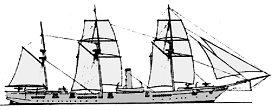

Tenryu 1885
| Name | No | Yard No | Builder | Laid down | Launched | Comp | Fate |
| 海門 [Kaimon] | Yokosuka K K | 1.9.1877 | 28.8.1882 | 13.3.1884 | lost 5.7.1904 | ||
| 天龍 [Tenryu] | Yokosuka K K | 9.2.1878 | 18.8.1883 | 5.3.1885 | stricken 12.1911 |
|
Displacement normal, t |
Kaimon: 1358 Tenryu: 1525 |
|
Displacement full, t |
Kaimon: 1429 |
|
Length, m |
Kaimon: 64.1 pp Tenryu: 64.7 pp |
|
Breadth, m |
Kaimon: 9.91 Tenryu: 10.8 |
|
Draught, m |
Kaimon: 4.98 Tenryu: 5.20 |
|
No of shafts |
1 |
|
Machinery |
1 HCRA, 4 cylindrical boilers |
|
Power, h. p. |
1267 |
|
Max speed, kts |
12 |
|
Fuel, t |
Kaimon: coal 197 Tenryu: coal 204 |
|
Endurance, nm(kts) |
|
|
Armament |
Kaimon: 1 x 1 - 173/22 RKL/25 C/72, 6 x 1 - 120/22 RKL/25 C/78, 1 x 1 - 79/25 RKL/27 C/73, 4 x 4 - 25/60 Nordenfelt Mk I, 1 x 4 - 11.4/94 Tenryu: 1 x 1 - 173/22 RKL/25 C/72, 1 x 1 - 149/22 RKL/25 C/74, 4 x 1 - 120/22 RKL/25 C/78, 1 x 1 - 79/25 RKL/27 C/73, 4 x 4 - 25/60 Nordenfelt Mk I |
|
Complement |
Kaimon: 210 Tenryu: 214 |
Project history: These barque-rigged corvettes were the most effective of the smaller types of warship in service in the Japanese Navy towards the end of the 19th century. They were built under French supervision and completed with Krupp armament. Both vessels were refined, a new bow replacing the original graceful knee stem, and military masts replacing the fore and main masts.
Modernizations: None.
Naval service: The ships carried out a number of operations during the Russo-Japanese war, the Kaimon being lost off Talieo Wan Bay 5 July 1904 when she struck a mine laid by Russian minelayer Yenisey. Tenryu survived the war and was finally removed from active service in 1906.
© Ivan Gogin, 2014